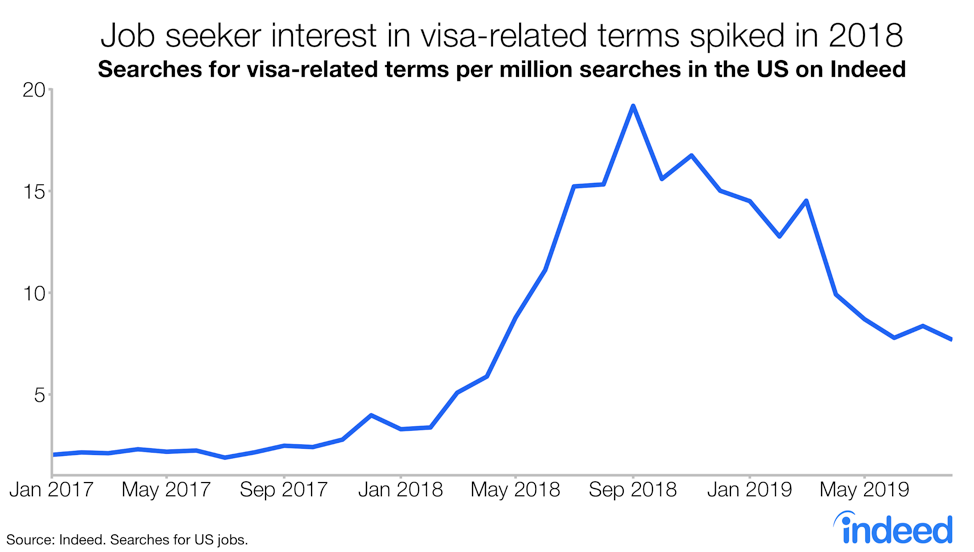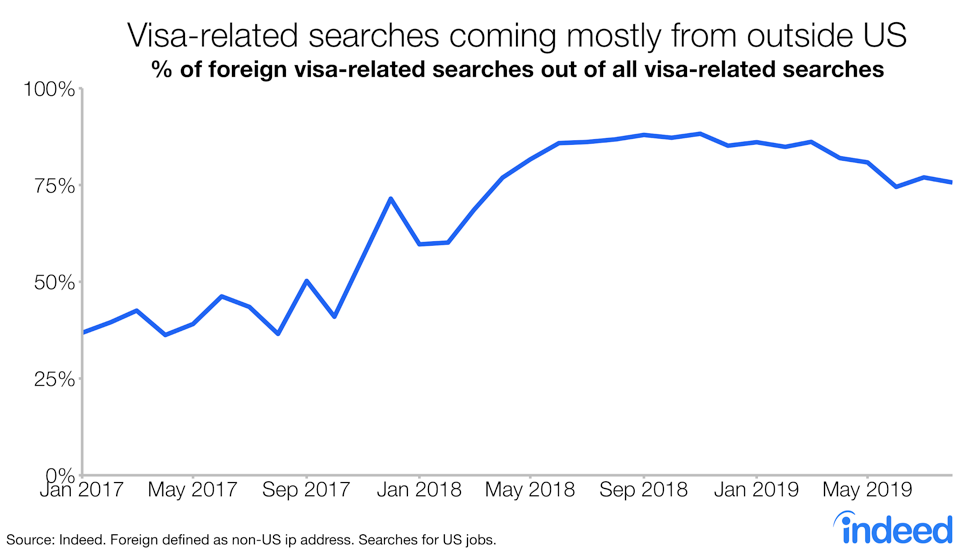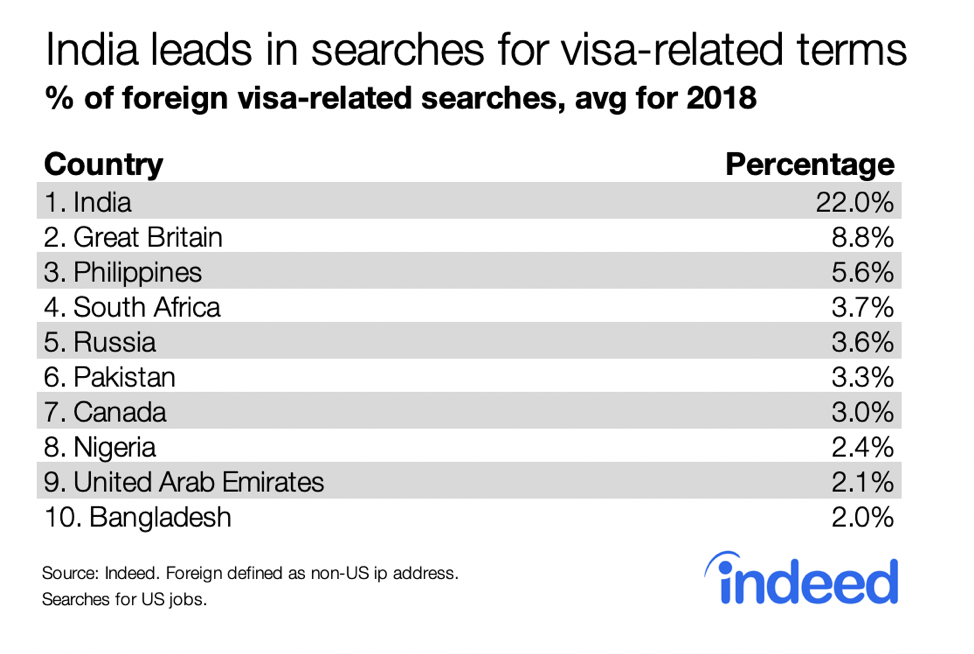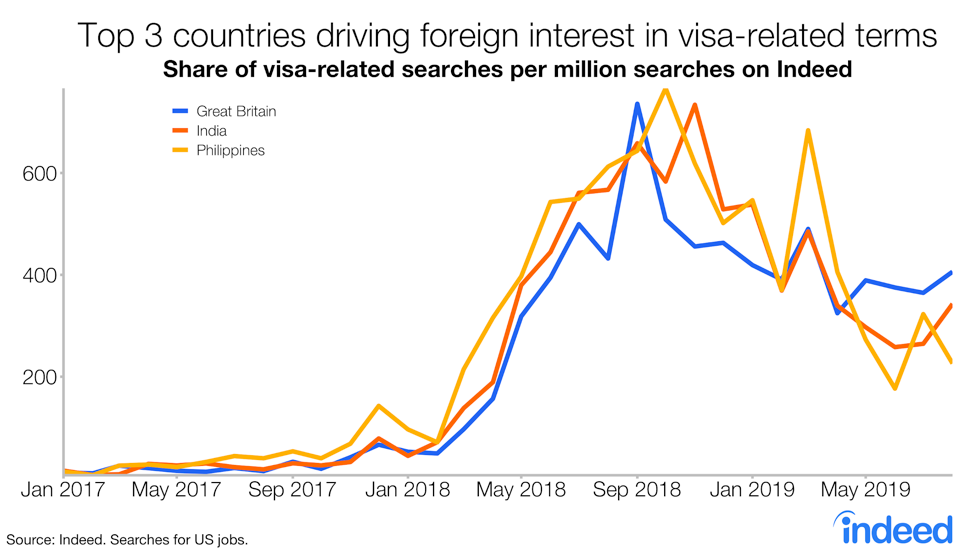Key Points:
- Searches for jobs in the US that contained visa-related terms like “H1B visa” or “work visa” skyrocketed 673% from September 2017 to September 2018.
- The number of visa-related searches from abroad peaked in November 2018.
- Job seekers in India accounted for 22% of visa-related searches from outside the US in 2018.
- The surge in visa-related searches probably reflects 2018 policy changes, which made acquiring a US work visa more complex.
Immigration has been a charged issue since the 2016 presidential election and the Trump administration has made tightening the nation’s borders one of its top priorities. That’s had an impact on the US job market, especially issuance of work visas that allow employers to bring in foreign workers on a temporary basis.
H1B visa denials are at a record level, while quotas for H2B visas have been raised. Both visa types allow US employers to temporarily employ foreign workers — H1B for specialty occupations and H2B for seasonal work. We looked at the effect of policy changes on searches for US jobs on Indeed.com containing visa-related terms such as “work visa” or “H1B visa.” We found a stunning 673% jump from September 2017 to September 2018 in US visa-related searches per 1 million searches, coinciding with the tightening of US H1B requirements. Visa-related searches remained elevated through January 2019 and started to decline this past spring.
The explanation seems clear. Foreign job seekers appear to be looking for employers that will sponsor them and have stepped up their hunt for jobs that offer to back visa applications.
Rise in job searches for visa-related terms comes mostly from abroad

The growth in searches for US jobs containing visa-related terms has come overwhelmingly from job seekers outside the US. In August 2019, the share of US visa-related searches from abroad was 75.6%, more than double its August 2017 level of 36.5%. The proportion of such searches from abroad peaked in November 2018 at 88.2%. Presumably, visa-related searches coming from inside the US are from foreign students or people already in the US on a work visa.

The key question is why. The surge probably reflects policy changes in 2018 that made acquiring a US work visa more complex. In April 2017, President Trump signed the Buy American and Hire American executive order, which affected the H1B visa process and came into full effect during the 2018 visa cycle, which starts in early spring and extends into fall. Additional policy changes were made throughout 2018, such as suspension of H1B visa premium processing and a policy directive changing adjudication proceedings.
We cannot say for sure whether the uptick in searches was from job seekers applying for a US work visa, in the midst of visa processing, or whose applications had been denied. Whatever the status of the job seekers, these policy changes appear to have prompted them to pick up their searches for employers that might sponsor visas.
Where are the searches abroad coming from?
To further understand the visa-related search trend, we broke down searches from outside the US by country. We found that, on average in 2018, job seekers in India accounted for 22% of all visa-related searches from abroad, two-and-a-half times greater than the share from the UK, the number-two nation. This is not surprising given that nearly 62.7% of initial H1B approvals in fiscal year 2017 were for Indian nationals. Overall, the top ten countries accounted for nearly 56.5% of all foreign visa-related searches in 2018.

The time trend for the top three countries is generally the same as for overall searches. The January 2019 spike from job seekers in the Philippines may have been due to the announcement that Filipinos were losing eligibility for temporary work visas.

Policy changes affecting US work visas seem to have had a big impact on job seeker search behavior. Hiring Lab will watch whether additional US work visa program changes influence how workers search for jobs.
Methodology
We define visa-related searches as those containing one or more of the following terms: “work visa,” “H1B visa,” “H1-B visa,” “H2B visa,” “H2-B visa,” “immigration visa,” “immigrant visa,” or “employment visa.” We looked at US searches, meaning job seeker searches on Indeed.com for the US or the US platform.
